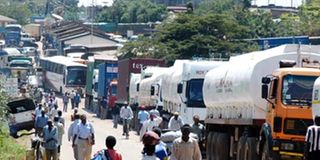Trucks to be weighed in motion

Trucks at Kenya’s Malaba border point transport goods to Uganda. Trucks will soon be weighed while in motion as a way of cutting the long lines at some weighbridges. This is also expected to reduce the time it takes to deliver cargo to destinations such as Uganda and Rwanda as well as their ultimate prices. PHOTO/FILE
What you need to know:
- Initiative meant to cut the long queues that drivers have to contend with at weighbridge stations along the route.
- This will come as a relief to goods owners, who have on many occasions incurred losses due to delays in delivering cargo to their destinations due to the long time spent at the various stationery weighbridges.
Trucks will soon be weighed while in motion as a way of cutting the long lines at some weighbridges.
This is also expected to reduce the time it takes to deliver cargo to destinations such as Uganda and Rwanda as well as their ultimate prices.
There have been perennial complaints over delays at weighbridges by cargo owners, a fact that is also blamed for the high cost of goods in the region.
“We shall soon install weigh-in-motion machines which are expected to cut the number of days for transporting cargo in the region from 14 to five.
We will start with Mariakani, then Athi River, Gilgil, Webuye, and Malaba,” said the Kenya National Highways Authority (KENHA) director-general, Mr Meshack Kidenda.
This will come as a relief to goods owners, who have on many occasions incurred losses due to delays in delivering cargo to their destinations due to the long time spent at the various stationery weighbridges.
“Once the machines are installed, trucks will not have to stop. Only those that fail to comply with the weight limits will be detained for further investigations. This way we shall not have the five per cent that have been overloading wasting time for the law-abiding ones,” he said.
Over the years, countries in the region have often complained about the delays at weighbridges that are also fraught with corruption claims which end up pushing the cost of the goods higher when they reach their destinations.
HEAVY PENALTIES
In January 2011, the government hired two private companies to manage the weighbridges — Avery Kenya Limited and RGS (K) Limited — in an attempt to improve efficiency and rein in corruption.
This, however, has not stopped persistent complaints by transporters about inefficiency at the weighbridges that result in delayed delivery of cargo.
Mr Kidenda said transporters who flout axle load rules will face punitive measures when arrested.
He added that the government had invested heavily in road construction and would not let a few transport companies destroy them.
The authority has been fighting truck owners who have devised ways of avoiding detection for overloading, including bribing officials at the weighbridges to escape prosecution.
KENHA last year banned lorries from stopping near the weigh stations, ostensibly for repairs when in reality they are engaged in manipulating the weight to avoid detection.
It also warned them about using dummy axles in their trucks meant for redistribution of weight.
A study conducted by CPCS Transcom indicates that truck drivers pay between Sh56,000 to Sh75,000 to corrupt officers between Mombasa and Kigali in Rwanda.





